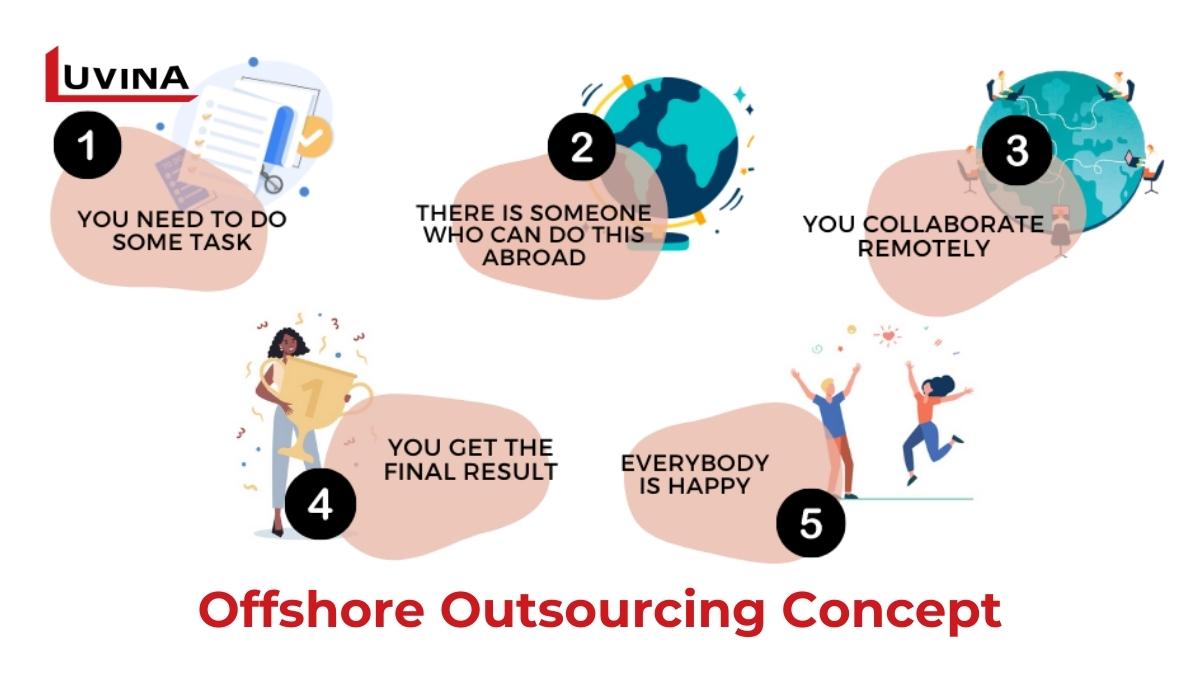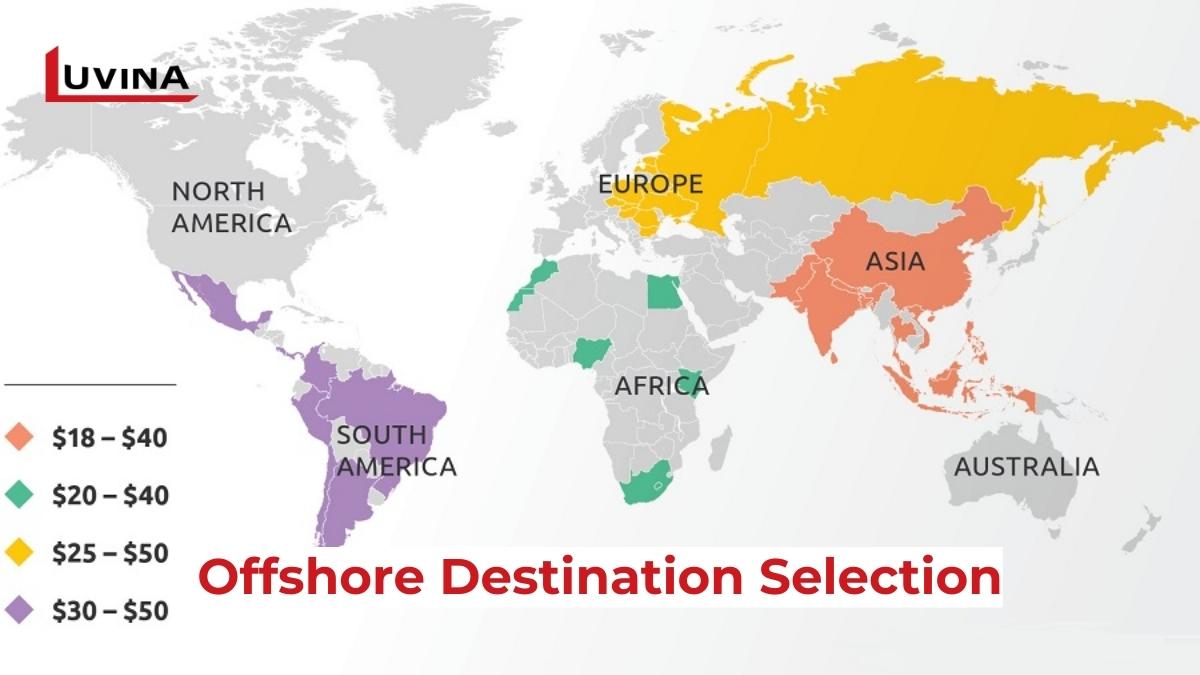In the modern business world, outsourcing is a crucial strategy for companies seeking to enhance efficiency, reduce expenses, and access specialized skills. In this comprehensive guide, we will delve into software development outsourcing, equipping you with the knowledge you need to make informed decisions in this transformative field.
Within this extensive guide, we will explore the realm of software development outsourcing, empowering you with the information and wisdom necessary to make well-informed choices on this transformative path.
Understanding Outsourcing Software Development
1. What is outsourcing software development?
At its core, outsourcing software development is a delegation of tasks where you partner with a foreign company or individual for your software development projects. These entities, such as Luvina Software, are known for delivering high-quality custom software development outsourcing services at costs lower than hiring in-house or local developers. This approach presents numerous advantages, including accessing a global talent pool, saving both time and money, and enabling you to focus on core business activities.

However, outsourcing software development services isn’t without its challenges. Issues like time zone differences, cultural and language barriers, and potential communication and quality concerns are factors to consider. Hence, the careful selection of the right partner and destination becomes pivotal for the success of your software development needs.
2. Why consider outsourcing?
Outsourcing is a strategic avenue that offers businesses a multitude of advantages. These include cost efficiency, global talent access, and heightened productivity. Let’s delve deeper into these compelling reasons for contemplating outsourcing:
- Cost Efficiency: Leveraging outsourcing allows you to cut expenses on software development by capitalizing on lower labor expenses, reducing taxes, and minimizing overheads in locations. According to Deloitte’s 2020 Global Outsourcing Survey, 70% of respondents pointed to cost reduction as the main reason for software outsourcing.
- Access to global talent: Outsourcing can help you find skilled and experienced software developers who can meet your specific requirements and expectations. You can access a larger and more diverse talent pool than your local market, and choose from various technologies, languages, and frameworks.
- Time zone advantages: Outsourcing can help you leverage time zone differences to your benefit. You can have a 24/7 development cycle, where your team works while you sleep, and vice versa. You can also deliver faster and more frequent updates to your customers, and respond to changing market demands.
- Effective team management: Outsourcing can help you manage your software development team more efficiently and conveniently. You can delegate the tasks and responsibilities to your partner, who will handle the recruitment, training, supervision, and evaluation of the developers. You can also communicate and collaborate with your team using various tools and platforms.
- Expert workforce: Outsourcing can help you benefit from the expertise and experience of your partner. You can rely on their knowledge of the best practices, standards, and methodologies in software development. You can also learn from their insights and feedback on your project.
- Consistent operations: Outsourcing can help you maintain consistent and uninterrupted operations for your software development project. You can avoid the risks of staff turnover, absenteeism, or unavailability that might affect your in-house or local team. You can also ensure the quality and security of your software by following the agreed-upon specifications and guidelines.
- Scalable: Outsourcing can help you scale up or down your software development team according to your needs. You can easily add or remove developers from your project without affecting the workflow or budget. You can also adjust the scope and features of your software as needed.
- Timely: Outsourcing can help you deliver your software project on time and within budget. You can set clear deadlines and milestones for your outsourcing team, and monitor their progress and performance. You can also avoid delays or errors caused by factors such as infrastructure, regulations, or logistics.
These are some of the benefits of outsourcing software development that you might want to consider. However, outsourcing also has some challenges and drawbacks that you should be aware of before making a decision. In the next section, we will discuss how to select the right partner and destination for your software development project.
Selecting the Right Outsourcing Partner
1. Choosing the ideal destination
Choosing the optimal destination is a pivotal decision that directly impacts the success of your outsourcing software development project. Several factors come into play, including cost, talent, infrastructure, culture, and time zone. Here are some essential insights on selecting the best destination tailored to your needs:

Cost-effectiveness
One of the main benefits of outsourcing is the potential for cost savings. You can compare the average hourly rates of software developers in different countries and regions, and choose the one that fits your budget. However, you should also consider other costs, such as taxes, fees, travel expenses, and currency exchange rates. Some outsourcing destinations offer tax incentives or exemptions for companies, which can lower your overall costs.
Talent pool and technical expertise
Another key factor to consider is the availability and quality of software developers in the destination. You want to find a country or region that has a large and diverse talent pool, with skills and experience in various technologies, languages, and frameworks. You can check the rankings and ratings of software developers by country or region, and look for reviews and testimonials from previous clients. You can also ask your potential partner about their recruitment, training, and retention policies.
Infrastructure and innovation
You also want to choose a destination that has a reliable and modern infrastructure, such as internet connectivity, electricity, transportation, and communication systems. You want to avoid any disruptions or delays in your software development project due to technical issues or natural disasters. You can also look for a country or region that has a strong innovation culture, with a supportive government, a vibrant startup scene, and a high level of research and development.
Cultural compatibility and time zone differences
Another factor to consider is the cultural fit and time zone difference between you and your outsourcing team. You want to find a country or region that has a similar or compatible culture, language, values, and work ethic as yours. You want to avoid any misunderstandings or conflicts due to cultural differences or communication barriers. You can also use time zone differences as an advantage, by having a 24/7 development cycle or faster delivery times. However, you should also ensure that you have regular and effective communication and collaboration with your team.
These are some of the tips on how to choose the ideal destination for your software development project. However, you should also do your research and analysis before making a final decision. You can use various tools and resources to compare and evaluate different outsourcing destinations. You can also consult with your potential partner or an expert in outsourcing to get more insights and recommendations.
2. Evaluating outsourcing partners
In the realm of outsourcing software development, it’s paramount to meticulously evaluate your outsourcing partners to ensure a fruitful collaboration. One of the key facets to scrutinize is their expertise. Assess their skills, qualifications, and experience in the software development domain. Delve deep into their technical prowess, understanding of industry best practices, and familiarity with cutting-edge technologies. Their proficiency in various programming languages, frameworks, and methodologies will play a pivotal role in the success of your project.
Reputation holds significant weight in your partner selection process. It encompasses not only their standing in the industry but also their track record of successful projects. Look for feedback from previous clients and examine any awards or certifications they may have garnered. Client references can offer invaluable insights into their performance and reliability. Ensuring a partner’s positive reputation can be a strong indicator of their capability to meet your software development needs.

Cultural compatibility is often an underrated but crucial aspect of software development partnerships. Explore the importance of aligning cultural values with your partner, as it can foster a harmonious working relationship. Consider language proficiency to facilitate effective communication. Furthermore, understanding and managing expectations on both sides is vital to avoid misunderstandings and ensure a smooth collaboration. Cultivating a culturally compatible partnership can lead to better cooperation, reducing potential hurdles during the software development process.
>> See more: Exploring Offshore Software Development Rates by Country
Legal and Contractual Considerations for Outsourcing
1. Drafting a comprehensive outsourcing contract
A well-structured contract is the foundation of a successful outsourcing partnership.
Drafting a comprehensive outsourcing contract is vital in ensuring a successful and mutually beneficial relationship between you and your partner. An outsourcing contract is a legal document that defines the scope, terms, and conditions of the outsourcing arrangement, as well as the rights and obligations of both parties. A well-written contract can help you avoid misunderstandings, disputes, and risks that might arise during the outsourcing process.
There are many aspects to consider when drafting an outsourcing contract, such as the services, deliverables, payment, timelines, quality standards, intellectual property, data protection, dispute resolution, and termination clauses. Depending on the type and complexity of your outsourcing project, you may need to use different types of contracts, such as time and materials, fixed price, or hybrid contracts.
To help you draft an effective and comprehensive outsourcing contract, here are some tips and best practices to follow:
- – Define the scope of work clearly and precisely. The scope of work should describe what services and deliverables you expect from your partner, as well as the specifications, requirements, and acceptance criteria for each task or milestone. You should also include any assumptions, dependencies, exclusions, or limitations that may affect the scope of work.
- – Seek legal advice from experts. Outsourcing contracts involve various legal issues and implications, such as jurisdiction, liability, indemnification, warranties, and force majeure. You should consult with a qualified lawyer who has experience in outsourcing contracts and who can advise you on the applicable laws and regulations in both your country and the destination.
- – Go for the win-win situation. Outsourcing contracts should be fair and balanced for both parties. You should avoid imposing unreasonable or unrealistic demands or expectations on your partner, as this may lead to dissatisfaction, resentment, or conflict. You should also respect your partner’s rights and interests, such as their confidentiality, intellectual property, and compensation.
- – Agree on penalties, benefits, or rewards. Outsourcing contracts should include incentives and disincentives for both parties to perform their obligations and meet their expectations. You should specify the consequences of non-performance or breach of contract by either party, such as penalties, damages, or termination. You should also specify the benefits or rewards for exceptional performance or achievement by either party, such as bonuses, discounts, or extensions.
- – Plan the finality of the deal. Outsourcing contracts should have a clear and definite end date or duration. You should also include provisions for terminating the contract before the end date in case of any unforeseen circumstances or events. You should outline the conditions and procedures for termination by either party, as well as the obligations and liabilities of both parties upon termination.
These are some of the tips on how to draft a comprehensive outsourcing contract. However, you should also do your research and analysis before signing any contract. You can use various tools and resources to find sample contracts or templates that suit your needs. You can also contact us for more information or assistance on outsourcing software development. We are a professional and reliable software development company that offers high-quality outsourcing services at competitive prices.
2. Mitigating risks and ensuring compliance
Undertaking outsourcing for your software development needs brings with it a distinctive set of risks and compliance considerations. It’s essential to recognize these challenges and take proactive steps to mitigate them.
One of the primary risks in software development is the potential for miscommunication or misunderstandings due to differences in language and culture. To address this, choose partners who are proficient in your language and share your business values.
Data security is another critical concern. Ensure that your partner complies with international data protection regulations and has robust security measures in place to safeguard your sensitive information.
Moreover, the geographical distance between your organization and the outsourcing team can lead to time zone disparities, which may affect project coordination and communication. Adopt strategies like overlapping work hours or utilizing project management tools to bridge this gap.
Economic and political stability in the outsourcing destination should be evaluated as well. Unexpected political events or economic downturns can impact your project’s continuity, so diversify your partnerships across stable regions.
Lastly, intellectual property (IP) protection is a critical component of risk mitigation. Ensure that your outsourcing partner respects IP rights and establishes legal agreements to safeguard your proprietary software and innovations.
Navigating these risks and ensuring compliance is a crucial part of a successful software development outsourcing strategy.
Managing Outsourcing Software Development Projects Effectively
1. Effective project management
In the realm of outsourcing software development, effective project management is the cornerstone of a successful venture. The complexities and intricacies of projects necessitate a keen focus on management, ensuring that every facet aligns with the objectives and expectations. Let’s explore the critical role of project management in the context of software development and how it ultimately determines the triumph of your endeavor.
Outsourcing software development projects require meticulous planning, execution, and monitoring. Project management serves as the guiding force that ensures your project adheres to predefined timelines, stays within budget, and most importantly, delivers the anticipated results. Whether you’re contemplating embarking on a Waterfall or Agile project management journey, understanding the strengths of each approach is pivotal for your project’s success.
The Waterfall model, with its structured and sequential approach, is well-suited for projects with clearly defined requirements. In the realm of outsourcing software development, this model can be instrumental when your project scope is well-established, and changes are minimal. It involves a series of distinct phases, from requirement analysis and system design to implementation and testing, with each phase building upon the previous one. This methodical approach provides clarity and predictability, making it easier to manage and mitigate risks. In the context of outsourcing software development, the Waterfall model can be particularly effective when the project scope is well-delineated, and changes are expected to be minimal throughout the development process.
On the other hand, the Agile project management model offers flexibility and adaptability. It’s the preferred choice when your project requires frequent reassessment and adjustments. Agile divides the project into smaller increments called “sprints” and encourages collaboration and customer feedback. This model is well-suited for outsourcing software development, especially when you anticipate evolving requirements and the need for frequent client involvement. It fosters transparency, adaptability, and the ability to respond swiftly to changes, making it a valuable choice for projects.
In the realm of software development, selecting the right project management model hinges on the specific needs and dynamics of your project. It’s vital to consider the project’s scope, expected changes, client involvement, and the need for flexibility. An in-depth understanding of these models enables you to make an informed decision that aligns with your project’s objectives, ensuring a smoother path to success.
In conclusion, the success of your outsourcing software development project largely rests on effective project management. Whether you opt for the structured approach of the Waterfall model or the adaptive nature of Agile, your choice should be a deliberate one based on the unique characteristics of your project. By doing so, you’re poised to navigate the complexities of outsourcing software development with confidence and achieve the desired results.
2. Effective communication and collaboration with the offshore team
Navigating the intricacies of software development involves more than just technical proficiency; it requires seamless communication and collaboration across time zones. When you’re embarking on a project that spans different regions, time zone differences can either be a barrier or an opportunity. In this section, we’ll delve into the importance of overcoming these challenges and provide practical strategies to bridge time zone gaps while fostering productive collaboration with your partners.
Time zone differences can be a source of concern for those engaged in outsourcing software development. However, with the right approach, they can be an advantage. The first step is recognizing the significance of clear and efficient communication in projects. Effective communication is the linchpin for project success and client satisfaction.

To bridge time zone gaps effectively, consider these strategies:
Overlapping Hours
Identify core working hours that overlap between your onshore and offshore teams. This overlap is the golden period for real-time collaboration. Use this time for meetings, discussions, and addressing critical issues. Leveraging overlapping hours ensures that everyone is on the same page, promoting synergy and reducing response times.
Leverage Technology:
In today’s digital age, a plethora of collaboration tools and software are at your disposal. Utilize communication platforms like Slack, Microsoft Teams, or other team messaging apps. These platforms enable asynchronous communication, ensuring that crucial information is shared regardless of time zone disparities.
Set Clear Expectations
Establish clear communication protocols and expectations within your team. Define response times, especially for urgent matters, and ensure everyone understands their role in maintaining effective communication. This clarity eliminates misunderstandings and streamlines the flow of information.
Regular Updates
Implement a structured approach to reporting and updates. Daily or weekly stand-up meetings can help synchronize progress and identify potential roadblocks. This routine keeps all team members informed and aligned with project goals.
Documentation
Emphasize the importance of thorough documentation. By maintaining detailed records of discussions, decisions, and action items, you create a reference point for all team members, regardless of their time zone. Documenting key information ensures continuity and mitigates the risk of miscommunication.
Cultural Awareness
Recognize and respect cultural differences within your team. Cultural nuances can influence communication styles and preferences. A global perspective can enhance collaboration and help avoid misunderstandings.
Rotation of Meetings
To distribute the burden of inconvenient meeting times, consider rotating meeting schedules. This approach ensures that team members from both sides share the responsibility of adjusting to time zone differences.
In essence, effective communication and collaboration across time zones are not insurmountable challenges. They are opportunities to harness the global pool of talent and expertise. By implementing these strategies, you can bridge the gaps created by time zone disparities and create a harmonious and productive working environment with your partners. In the world of outsourcing software development, the ability to transcend time zones is a valuable asset, facilitating the successful completion of projects and the achievement of business objectives.
3. How to ensure software quality in outsourcing
Quality assurance and testing lie at the core of software development, ensuring the delivery of high-quality results. In this section, we’ll shed light on the pivotal role of maintaining stringent quality standards in projects and provide you with best practices to guarantee excellence in your software development endeavors.
Comprehensive Test Planning
Effective quality assurance begins with thorough test planning. Define your testing objectives, scope, and criteria right from the project’s inception. This planning phase should encompass the identification of critical functionalities, possible test scenarios, and the allocation of resources for testing.
Bug Tracking and Reporting
Implement a robust bug-tracking and reporting system. Document issues systematically, including their severity, steps to reproduce, and their current status. Effective bug tracking aids in prioritizing and resolving problems efficiently.
Continuous Improvement
Strive for a culture of continuous improvement in your quality assurance processes. Regularly assess your testing methodologies, tools, and strategies. Adapt to emerging trends and technologies, ensuring that your testing practices remain current and effective.
Collaboration with Development Teams
Maintain open and transparent communication between your development and testing teams—Foster collaboration to bridge gaps in understanding and align on project goals. Regular meetings and feedback loops enhance the synergy between these crucial facets of the development process.
In conclusion, quality assurance and testing are not mere formalities but the bedrock of software development. By adhering to these best practices and principles, you can elevate your projects to meet and exceed quality standards. Quality assurance ensures that your software functions as intended delivers exceptional user experiences, and ultimately contributes to the success of your business. In the world of software development, uncompromising quality is the differentiator that sets you apart and secures client trust.
The Future of Software Development Outsourcing
The future of software development outsourcing is an exciting and dynamic landscape evolving to meet the ever-changing needs of businesses and organizations worldwide. As technology advances and the global marketplace becomes increasingly interconnected, software development is expected to play a pivotal role in shaping the future of the IT industry. Here are some key trends and insights into the future of software development outsourcing:
- AI and Automation: The integration of artificial intelligence (AI) and automation into software development processes will revolutionize outsourcing. AI-driven tools will enhance code quality, automate testing, and streamline development tasks, resulting in faster project delivery and reduced costs.
- Cybersecurity Focus: As data breaches and cyber threats become more prevalent, teams will prioritize cybersecurity in software development. Ensuring the security of applications and data will be a top concern for businesses outsourcing their development projects.
- Hybrid Development Models: Outsourcing will increasingly involve hybrid models that combine onshore and teams. This approach balances proximity for collaboration with the cost-efficiency of development.
- Edge Computing: With the rise of edge computing, teams will be at the forefront of developing applications that process data closer to the source. This trend will require expertise in IoT and edge technologies.
- Distributed Teams: Remote and distributed development teams will become the norm, enabling access to a global talent pool. Project managers and businesses will need to adapt to effectively manage and collaborate with diverse teams.
- Industry-Specific Expertise: Outsourcing will see a surge in demand for industry-specific expertise. From healthcare to finance, businesses will seek development partners with deep knowledge of their sector’s unique requirements.
In conclusion, the future of software development outsourcing is marked by innovation, adaptability, and a commitment to meeting the diverse needs of clients worldwide. As businesses embrace digital transformation, development will continue to be a strategic choice for accessing top talent, reducing costs, and accelerating time-to-market. To thrive in this evolving landscape, both outsourcing providers and businesses must remain agile and stay at the forefront of emerging technologies and best practices. The future promises new possibilities and opportunities for those who embrace software development as a strategic advantage.
>> Read more: Software Development Trends in the Post-pandemic World
Conclusion
The comprehensive guide to software development outsourcing explores its vital role in modern business. It discusses the benefits, challenges, and strategies for selecting the right partner and destination. The importance of quality assurance, project management, and communication in projects is highlighted. The article also looks into the future of outsourcing, emphasizing trends like AI, blockchain, and cybersecurity. In summary, it provides a roadmap for businesses to thrive in the world of software development outsourcing.
In the ever-evolving landscape of contemporary business, the strategic use of outsourcing has become instrumental for companies looking to streamline operations, cut costs, and tap into specialized skills. Among the myriad forms of outsourcing, software development shines as a prominent choice. Luvina Software is a leading company that excels in solving challenges while harnessing the benefits of IT outsourcing.









Read More From Us?
Sign up for our newsletter
Read More From Us?
Sign up for our newsletter